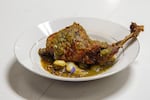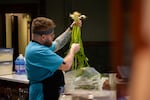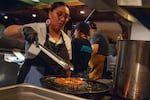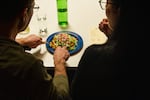This story originally appeared on Underscore.news.
Big beaded earrings glinting in the fluorescent kitchen lights, Alexa Numkena-Anderson directed her small team as they began preparing the kitchen at Street Disco in Southeast Portland on the last Wednesday night of February, hours before customers would begin to trickle in for the dinner rush.
Since November, Numkena-Anderson, enrolled Hopi and a descendant of the Yakama, Cree and Skokomish nations, and her team of three have brought Indigenous cuisine to the dining scene in Portland.
At pop-up restaurant Javelina, founder and head chef Numkena-Anderson blends Indigenous comfort foods and non-colonial ingredients creating a uniquely Indigenous fine dining experience. While the menu evolves with the seasons, each iteration features some version of frybread, first foods and wild game.
The team at Javelina has hosted two dozen pop-up dinners at host restaurants across Portland since the launch event on Nov. 12. They have also catered half a dozen events since then. From frybread “NDN” tacos and Sonoran hotdogs to three sisters baked potatoes and wild rabbit leg, the food pays homage to Numkena-Anderson’s Indigenous and Mexican heritage.
“I am Native and then half Mexican as well from my dad’s side and my grandparents are from Mexico, so I live in two worlds,” Numkena-Anderson said. “I am who I am and we are making food that represents both sides of me.”

Wild Rabbit Leg is a first foods dish with braised wild rabbit topped with a verde sauce, house made tajín, on a bed of lima beans and puffed wild rice.
Jarrette Werk / Underscore News / Report for America
Creating an Indigenous kitchen
Now 29, Numkena-Anderson has been working in restaurants since she turned 18. She learned how to cook as a child. The oldest of six, Numkena-Anderson spent many hours babysitting her younger siblings — which meant feeding them as well.
“I used to have to try to figure out how to make $20 last us for the week,” she said. “I would go to the cupboards and go to the cookbooks and I would search what ingredients we had and I’d try to make something even if I didn’t know what it was.”
Back in November, Numkena-Anderson and her team hosted the first Javelina pop-up at Morchella. Only six weeks earlier, Numkena-Anderson had given birth to her first child.
“It was physically painful and very emotional,” Numkena-Anderson said about the first pop-up event.

Javelina chef and owner Alexa Numkena-Anderson is a Hopi citizen and a descendant of the Yakama, Cree and Skokomish nations. For the past year, she and her team have brought Indigenous culture and cuisine to nearly two dozen pop up events around Portland.
Jarrette Werk / Underscore / Report for America
Running the restaurant as a pop-up has meant Numkena-Anderson’s daughter has been able to come to many of the events with her nanny. Hearing her baby’s laughter in the background while she bustles around the kitchen and being able to give her a kiss in rare moments of down time has been incredible for Numkena-Anderson and her husband, Nicholas Numkena-Anderson, who also works at Javelina as the operations manager.
“If she’s there, I’m stoked,” Numkena-Anderson said.
Numkena-Anderson and her husband met while working at a restaurant in Portland called Three Degrees. Now, they are a perfect team when it comes to running Javelina.
“He was front of house and then I was back of house and so we’ve always complimented each other,” Numkena-Anderson said. “Anything that I didn’t know how to do, he knew how to do.”

Nicholas Numkena-Anderson, Alexa's husband and operations manager for Javelina, examines a bunch of wild leeks, pulling stands out that are damaged, before chopping and charring them for dishes like the "Sunchoke and Corn Truffle Banaha" and "Three Sisters Baked Potato."
Jarrette Werk / Underscore News / Report for America
The other third of the three-person core team at Javelina, Chef de Cuisine Steven Stimek, also met Numkena-Anderson while working in a kitchen.
In 2018, Numkena-Anderson took a job as a line cook at Domaine Serene winery in Newberg, where Stimek worked as the sous chef. In 2019, she became Stimek’s sous chef at Radio Room in Portland, until the COVID-19 pandemic shut restaurants down for months.
“It’s really nice for me as a mentor to see her grow,” Stimek said.
Now, he works under her leadership at Javelina.
Related: New reporting project focuses on Indigenous food sovereignty in the Columbia River Basin
The inspiration for Javelina really struck during the pandemic, as Numkena-Anderson and her husband would spend hours creating mock menus that featured Indigenous foods. Though Numkena-Anderson is currently the only Indigenous member of her core team at Javelina, she hopes to hire more Indigenous chefs in the future.
“I really want to be able to hire other Native folks and teach them how to cook, because I think a lot of power and health comes from knowing how to cook,” Numkena-Anderson said.
She already has tentative plans for her oldest little sister and her youngest brother to join the team within a few years.
Related: Superabundant dispatch: Exploring the Northwest’s Indigenous foods
Playing with flavors
Pop music blared in the background during a recent pop-up at Street Disco as Numkena-Anderson switched on the KitchenAid mixer and watched ingredients blend to form the perfect frybread dough. Later, she shaped the dough and fried it in a cast iron pan sizzling with hot oil.
Originally made in the late 1800s, frybread is a testament to the resiliency of Native people. Turning government rations of flour, salt, sugar and lard into a staple food found across many reservations, those ingredients represented a lack of access to traditional first foods. Now, frybread is perhaps the most well-known Native American dish, commonly found at powwows, fundraisers and community events across Turtle Island.
“Frybread brings me so much comfort,” Numkena-Anderson said. “It brings comfort even though it has a terrible history. And I mean, I think that’s the power of people of color is, we can take a hardship and turn it around.”

Alexa Numkena-Anderson, Javelina chef and owner, flips a piece of frybread cooking in hot oil at the Street Disco kitchen in southeast Portland on Feb. 28, 2024.
Jarrette Werk / Underscore News / Report for America
Though each menu may change slightly, depending on what is in season and what the team at Javelina has harvested themselves, each dish seamlessly blends the flavors of the Southwest with ingredients of the Northwest.
At the pop-up at Street Disco on Feb. 28, ingredients ranged from wild leeks, sunchokes and huckleberry barbeque sauce to chestnut mushrooms, steelhead trout, wild rabbit and tepary beans.
Frybread and potato soup are a nod to Numkena-Anderson’s Yakama grandmother. The Sonoran hot dog represents her husband’s roots in Arizona.
Incorporating comfort food dishes with strictly Indigenous, first foods, allows the chefs at Javelina to really experiment with the flavors to create a unique dining experience.
“The ability to play with flavors, that’s kind of what I like about cooking,” Stimek said. “Being able to cook the food that’s from the land that I grew up on, is important to me. As a chef, it’s always been about how you can connect to the place that you are, the place that you cook in.”
Related: This Indigenous-led farmers market in Portland is a destination for all
In mid-March, Stimek, Numkena-Anderson and her husband went foraging for nettles, mustard greens, dandelion roots and other ingredients to use for their March 21 pop-up at Morchella.
Though all of the dishes are made with high quality ingredients and the pop-up has a fine dining feel, most dishes are priced at $20 or less.
Javelina is creating a fine dining experience with Indigenous first foods that many people would not have access to because of colonization. And staff are bringing those flavors to the community at a reasonable price, flipping the idea that a fine dining experience must be expensive.
“I want us to be able to pay our bills, but I don’t want to push away people that don’t have as much money,” Numkena-Anderson said. “I want it to be accessible.”
Creating an Indigenous dining experience open to all kinds of people, especially the Indigenous population in Portland, felt important to the whole Javelina team.
“I don’t want to price you out of your heritage,” Stimek said. “That’s the most colonizing thing you can do.”

Steven Stimek, chef de cuisine for Javelina, pours verde sauce into bottles, which will be used to drizzle sauce on braised wild rabbit legs.
Jarrette Werk / Underscore News / Report for America
Dreams of a brick-and-mortar
A pop-up restaurant certainly has its perks for the Numkena-Andersons, namely the ability to spend more time at home with their six-month-old daughter.
“For us, we always wanted to express ourselves creatively and make it to restaurant ownership,” Numkena-Anderson said. “After my daughter was born, I was trying to think about what’s the best thing for her. And for me, that’s us being with her.”
Now, the couple works really hard over the 48 hours leading up to and during each Javelina pop-up, which happen three to four times a month. The rest of their time gets to be spent raising their daughter.
Currently, a pop-up style restaurant works great for the crew at Javelina. But down the line, they have goals of a brick-and-mortar restaurant, likely with an Indigenous food lab component similar to what Sean Sherman has created with Owamni and NĀTIFS.
Related: How some Northwest tribes cultivate land for first foods and traditional medicines
When learning to cook first foods, Numkena-Anderson turned to Sherman for leadership.
“Sean Sherman’s cookbook, ‘The Sioux Chef,’ has been very helpful and very inspirational,” Numkena-Anderson said.
In her own journey of learning to cook Indigenous food, Numkena-Anderson saw a lack of access not only to traditional foods, but to recipes as well. That is why an educational component to her kitchen, like through an Indigenous food lab, is one of her goals.
For Numkena-Anderson, Javelina is about inspiring the next generation of Indigenous chefs.

Customers slice into Javelina’s pillowy soft Frybread NDN Taco. Frybread originated in the late 1800s, when Indigenous nations were forced to utilize government rations to feed their people. Prohibited from leaving reservation lands to hunt and gather traditional foods, colonial ingredients like flour, salt, sugar and lard were turned into frybread. Now, it has become a staple food for communities across Turtle Island, as a testament to the resiliency of Native people.
Jarrette Werk / Underscore News / Report for America
Corrections: The story has been updated to say Alexa Numkena-Anderson and her husband met at a restaurant called Three Degrees, and her grandmother is from the Yakama Nation. Underscore and OPB regret the errors.
Underscore is a nonprofit collaborative reporting team in Portland focused on investigative reporting and Indian Country coverage. It is supported by foundations, corporate sponsors and donor contributions. Follow Underscore on Facebook and X.
